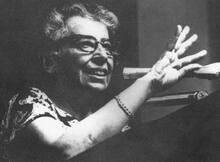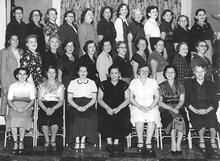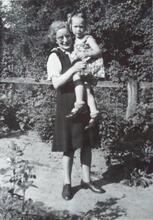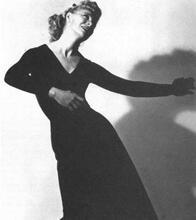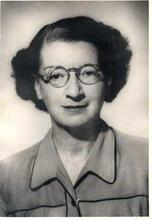Ana Pauker
Born to an impoverished Orthodox family in Bucharest, Ana Pauker joined the Romanian communist movement in 1915. Though her husband was purged by Stalin, she remained steadfast in her commitment to the Comintern and led resistance against the Nazis in Romania. At the end of the war, she was appointed to the Romanian Politburo and became one of the most powerful Communist leaders in Romania and, according to Time magazine, “the most powerful woman alive.” Though she was regarded as pro-Moscow, she was actually a moderating force and opposed many of Stalin’s reforms, defending peasants and Jews from forced collectivization and antisemitism. This led to her removal and arrest in 1953, though after Stalin’s death a year later she was freed. She remained a pariah and died in 1960.
The Revolutionary
Born Ana Rabinsohn in the Moldavian village of Codaesti on December 13, 1893, she was one of six children (two having died in infancy) of an impoverished Orthodox Jewish household in Bucharest. Her father, Hersh Kaufman Rabinsohn, was a ritual slaughterer (shohet) and synagogue functionary, her mother Sarah, a small-time food seller. Quickly excelling in her studies and given professional training at deferred cost, Ana (beginning in 1910 or 1911) taught first grade at a Jewish primary school and then Hebrew and Jewish studies at a community professional school. In 1915, she joined the Romanian Workers’ Social Democratic Party and adhered to its pro-Bolshevik wing after the October 1917 Russian Revolution. At the same time she continued teaching in the Jewish community, was active in maintaining a hostel for impoverished Jewish children, and took part in defense units protecting Jews against the pogroms that broke out in Bucharest in 1918. Three years later, she married the Romanian Jewish socialist Marcel Pauker (1896–c. 1936–1939), and both joined the Communists after their split from the Social Democrats in 1921. Their first child, a girl named Tanio who was born in Bucharest in December 1921, died of dysentery seven months later. A son, Vlad, was born in Vienna in 1926, a daughter, Tatiana, in Moscow in 1928. Pauker’s daughter, Marie, was born in Moscow in 1932, fathered by Eugen Fried, a Czech Jew who headed the Comintern’s team of instructors to the French Communist Party, with whom Pauker served in Paris from 1930 to 1932. At the behest of the Soviet leadership, she placed two of her children in children’s homes in the Soviet Union and the third in France with the family of the head of the French Communist Party.
Arrested and brutally treated on several occasions in 1923 and 1924, Ana and Marcel Pauker spent a number of years in exile in Prague, Berlin, and Paris. In 1928, Ana was admitted to the Lenin School in Moscow, which trained the top functionaries of the Communist International (Comintern). Rapidly rising into the Comintern hierarchy, she became a close associate of Dmitri Manuilsky and spent two years in Paris as a special instructor to the French Communist Party. Returning to Romania in 1934, she was arrested the following year, tried in a highly publicized trial, and sentenced to ten years in prison. While incarcerated she learned that her husband had been one of the countless communists purged in Moscow during the Great Terror of 1936–39. Long rumored to have publicly denounced Marcel as a “Trotskyist traitor,” Ana Pauker in fact refused to do so even among her fellow Communists in prison—despite repeated calls to that effect by her Comintern superiors. Traded by the Romanian government in a prisoner exchange with the Soviets in May 1941, she dared not inquire into her husband’s whereabouts once in Moscow. Although she suspected the worst, she knew of his execution only in 1959.
Rise to Power
After the German invasion of the USSR in June 1941, Ana Pauker worked at the Comintern’s “Free Romania” radio station, organized the first divisions of Red Army volunteers among Romanian prisoners of war, and was an official signatory to the Comintern’s dissolution in 1943. Returning to Bucharest in September 1944 with a mandate to take over the Romanian Communist Party (RCP), she served as its unofficial leader until October 1945, when Gheorghe Gheorghiu-Dej was formally “elected” as the RCP’s General Secretary. Nevertheless, Ana Pauker remained for several years the country’s true behind-the-scenes leader (with positions in both the Party Secretariat and the Politburo)––prompting Time Magazine to describe her in September 1948 as “the most powerful woman alive.” Among the party positions she held between 1947 and 1952 were those of Secretary of the Central Committee, member of the Politburo, secretary in charge of agriculture and secretary in charge of organizational matters.
Pauker’s Influence
Universally regarded as the Soviets’ most trusted agent in Romania––“her fanatical subservience to Moscow,” one observer noted, “was not only undisputed, it was legendary”—Ana Pauker became synonymous with the terror and repression of her country’s Stalinist period. Archival discoveries, however, demonstrate that she was actually a force for moderation in the Romanian Politburo, often contradicting the Stalinist line set down by Moscow. Having opposed the Soviet “advisers” on exploiting the peasantry in September 1947 (the very month of the founding of the Cominform, which was to “coordinate”—that is, dictate—policy in the bloc), Pauker was appointed Agriculture Secretary at her insistence and personally oversaw collectivization after the Kremlin had imposed it in 1948. Resisting the Soviet “advisers” on setting a fixed and inflated number of collective farms, Pauker persistently claimed that collectivization could proceed only after the country had become sufficiently mechanized through industrialization, even though the Stalinist line suggested just the opposite: that collectivization was the means for acquiring as much capital from the peasantry as possible to finance industrialization. In June 1950, however, while Pauker was hospitalized in Moscow for breast cancer, Romania’s leaders—at the behest of the Soviets—waged a repressive campaign of forced collectivization and launched a wave of terror against “kulaks” throughout the countryside. When she returned to her duties at the end of 1950, Pauker halted collectivization in its tracks (refusing to establish even one new collective farm in 1951) and froze the anti-kulak campaign. Promoting as well a more liberal approach to the mandatory collections of peasant produce, Ana Pauker (to quote one colleague) emerged as “the patron of the peasantry” within the Romanian leadership—all quite to the chagrin of her Soviet masters.
Likewise, Pauker resisted Soviet pressure to stage an anti-Tito show trial in Romania, unlike her contemporaries in Hungary, Albania, Bulgaria, and Czechoslovakia. Hence she opposed the frame-up of the former Justice Minister, Lucretiu Patrascanu, and the Romanian veterans of the Spanish Civil War, as imperialist spies. It was only after her own downfall that Patrascanu was finally brought to trial and executed, and that the Spanish Civil War veterans were repressed en masse in Romania.
Further, Ana Pauker pursued an independent line fostering the mass emigration of Romanian Jews to Israel after the Soviets had turned against the Jewish state in late 1948. She also opposed prosecuting the leaders of the Romanian Zionist movement, who had begun to be arrested in July 1950. Despite the Kremlin’s escalating “anti-Zionist” campaign, no Zionist leaders were tried in Romania as long as Pauker remained in power; but once she was ousted, they were all prosecuted in a series of trials in 1953 and 1954.
A Jewish communist largely untainted by self-hatred, Ana Pauker rejected Marxism-Leninism’s class-based approach to the “Jewish Question” and argued in the Politburo that all Jews regardless of class were oppressed and had been victimized by antisemitism even of the working class. In so doing, she conspicuously contradicted the increasingly antisemitic line then emanating from Moscow.
Fall from Power
However, Stalin’s antisemitism would soon catch up with her. Pauker was purged from her Party and government posts for “right-wing deviationism” in May 1952 and arrested on February 18, 1953. Imprisoned as well was her younger brother, Zalman Rabinsohn. An Orthodox Jew and member of the Ha-Po’el ha-Mizrachi religious Zionist movement, Rabinsohn had emigrated to Palestine with his family in May 1944 but returned to Romania in November 1949 ostensibly for a visit. Almost immediately, he began to intervene with his sister on matters concerning the Jewish community, particularly the fate of the Romanian Zionist leaders; in turn, he relayed to Zionist contacts (and, through them, the Israeli embassy) information garnered from Pauker personally. With her downfall, these actions were depicted in the worst possible light: both were accused of “espionage” for the United States through its principal agent, “international Zionism.”
Pauker’s trial, however, was abruptly cancelled after Stalin’s death in March 1953. She was released from prison soon afterwards, placed under house arrest until early 1954, and then allowed to reside with her children in Bucharest. Shunned by her former protegés and admirers, Ana Pauker remained an ostracized pariah until her death of a recurrence of cancer on June 3, 1960.
“A Girl Who Hated Cream Puffs,” Time, September 20, 1948.
Levy, Robert. Ana Pauker: The Rise and Fall of a Jewish Communist. Berkeley and Los Angeles: University of California Press, 2001.
Mircu, Marius. Ana Pauker si altii (Ana Pauker and the Others). Bat Yam, Israel: 1989.
Rosen, Moses. Dangers, Tests and Miracles: The Remarkable Life Story of Chief Rabbi Rosen of Romania as told to Joseph Finkelstone. London: Weidenfeld and Nicolson, 1990.
Shephard, Gordon. Russia’s Danubian Empire. London: Heinemann, 1954.



